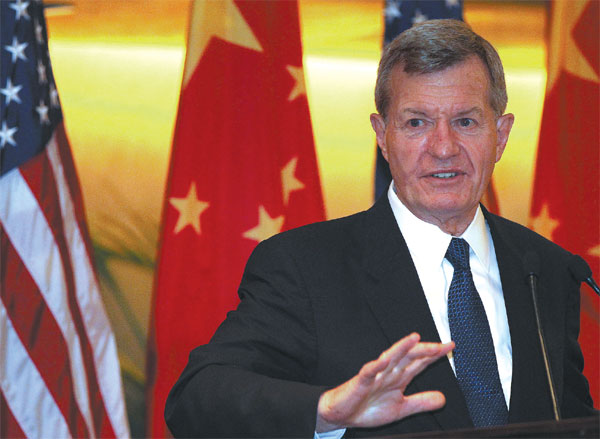Baucus: Investment pact opens a new chapter
|
Max Baucus, US ambassador to China, speaks to hundreds of members of the American Chamber of Commerce in Beijing on Wednesday. This is his first public speech since assuming the post earlier this year. Zou Hong / China Daily |
The new United States ambassador to China, Max Baucus, said on Wednesday that advancing a bilateral investment treaty between the world's two largest economies will be his top priority.
"While we still have a lot of work to do for concluding the treaty, helping move it forward would be a top priority of mine. I am going to work very hard to make this bilateral investment treaty successful," Baucus said while addressing members of the American Chamber of Commerce in China, in his first public speech in the country.
A member of the Democratic Party, Baucus was appointed to the post by US President Barack Obama in February, succeeding Gary Locke.
When he was in the US Senate, Baucus strongly supported permanent normal trade relations with China and China's subsequent entry into the World Trade Organization.
China and the US started discussing the treaty in 2008, but talks stalled with China's insistence on a long list of protection for some sectors.
The two sides restarted negotiations in July 2013 for a pact that incorporates national treatment for both new and existing investments while having a "negative list" to cover all investments except those specifically excluded.
The 13th round of negotiations was held in Beijing from June 9 to 13.
"The US-China bilateral investment treaty ... can do for China's investment climate what the WTO accession did ... Back then it was trade, now the BIT can help open up China's trading climate, its markets, particularly its service industries and help rebalance in a more sustainable direction and create better jobs for its growing number of college graduates," Baucus said.
The US is the world's top recipient of foreign direct investment, followed by China. Analysts believe a bilateral investment pact will help reshape global investment rules.
"The Sino-US treaty talks and the introduction of the 'negative list' approach in the China (Shanghai) Pilot Free Trade Zone show the Chinese government's determination to reform the regulations for foreign investment," Zhan Xiaoning, director of the investment and enterprise division at the United Nations Conference on Trade and Development, said in a note on Tuesday.
"China needs to engage in the building of higher global investment rules through participating in high-standard bilateral, regional and multilateral investment pact talks," Zhan said.
Baucus noted that China is "again at a critical junction" in its development and new challenges have emerged.
"Building a modern, energy-efficient, innovative economy that can deliver equitable and sustainable growth required a new round of broad-based reform when China joined the WTO," Baucus said. "I believe China now faces a new WTO moment."
The annual Strategic and Economic Dialogue between China and the US is scheduled to take place in early July, where the two countries will discuss a wide range of bilateral, regional and global political, strategic, security, and economic issues.
"We will use the dialogue to advocate aggressively the things that matter most to the business community, that is, removing investment restrictions, improving (intellectual property rights) protection, increasing transparency, especially in regulatory proceedings, and creating a level playing field for all companies in China," the ambassador said.
He added that environment will also remain a top priority of his tenure.
Contact the writers at lijiabao@chinadaily.com.cn and muchen@chinadaily.com.cn



















